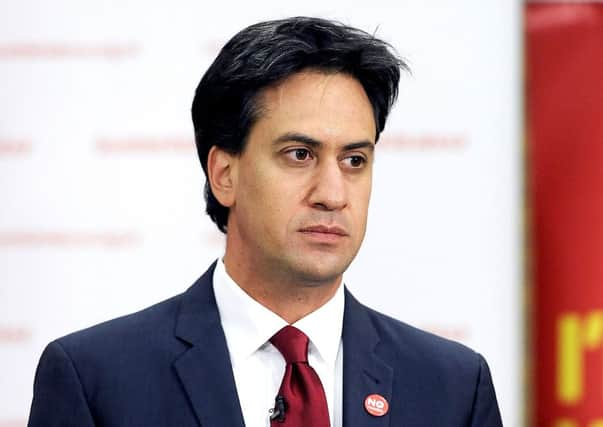Sam Ghibaldan: Time to end constitutional quirk


The infamous rotten boroughs of 18th-century British politics, and the West Lothian Question – Scottish MPs voting on England-only issues – have a lot in common.
Both came about as the political process failed to respond to change, in one case to population shifts that saw people relocate from the countryside to towns, and in the other the establishment of the Scottish Parliament. Both resulted in MPs being able to vote on issues despite not truly representing those affected.
Advertisement
Hide AdAdvertisement
Hide AdIn the 18th century, of course, the whole political system was largely corrupt and the rotten boroughs provided yet more opportunities for bribery. The West Lothian Question does not do that, thankfully, but it is nevertheless a serious democratic aberration, pushed back to the top of the political agenda by the independence referendum.
The concern is something we British like to think of as our own: fairness. Why should Scottish – or for that matter Welsh or Northern Irish – MPs, vote on English issues, when their English counterparts cannot vote on Scottish, Welsh or Northern Irish ones?
The answer to that – they shouldn’t – is so obvious that most Scottish voters, let alone English ones, oppose their MPs voting on English issues. It is one of those rare constitutional questions that chimes with the electorate, appealing directly to their inherent sense of justice.
And it leaves Ed Miliband in a vexatious bind. His party consistently wins a large majority of Scottish and Welsh seats in UK elections, a major boost for it in House of Commons’ votes. A future Labour government that couldn’t call upon those MPs to back it on English policy issues would be significantly more vulnerable to defeat.
More immediately, though, the English question is an electoral threat to Labour.
The Tories are positively salivating at the thought of running a twin-themed campaign, contrasting their economic competence to that of Labour and portraying Miliband as discriminating against English voters, refusing them the same rights as their Scottish brethren. In marginal seats south of the Border, that could make things very painful for Labour; it could even cost them the election.
Caught between those conflicting political realities, Labour’s response to David Cameron’s raising of the English question has been shambolic. Claims that there are dangers in having different categories of MPs has simply given the impression that Labour would put party interest before that of the voters.
Miliband’s proposal of a UK Constitutional Convention, but in a year’s time, screamed “kick it into the long grass”.
Can Miliband turn this around?
Advertisement
Hide AdAdvertisement
Hide AdFirst things first. He must accept this issue is not going to go away.
Despite Labour’s efforts to gloss over it, this is a political itch that is becoming persistent. Miliband would be better leading, taking the credit for change, than going down both in the forthcoming election and in history as the defender of the indefensible.
To get on the right side of the argument, he must take a stand on the principle that decisions should be taken by the MPs representing those constituencies affected by them. No constituency, no vote.
There is, though, some truth in his point that the question is more complicated than it appears on the surface. Some legislation is primarily English, but has clauses or budget consequentials that do have relevance in Scotland, Wales or Northern Ireland.
These are issues of process not principle, though, and are not beyond the wit of humans – or even politicians – to resolve. They do, however, need careful consideration if a coherent, lasting solution is to be found.
The right forum for that – as Miliband and the Liberal Democrats have suggested – is a UK Constitutional Convention, along the lines of that in Scotland in the 1990s. For perhaps the first time, it should look at the messy UK constitution in the round, considering how all the different bits should fit together, balance each other and complement each other.
It is not, after all, just the question of the votes affecting the four nations; how should the London Assembly fit into this jigsaw? What about the English regions? Given its strong identity and distinct legal system, is there a case for an English parliament? And what should be the role of a reformed House of Lords?
The second part of Miliband’s strategy then, should be to reiterate his call for a constitutional convention, but to get it started now.
Advertisement
Hide AdAdvertisement
Hide AdSet up and under way, with all the parties participating, it would help Labour neutralise English votes as an election issue.
There are two factors that should give Labour some reassurance in taking the plunge on English votes for English issues.
To start, it may not be as bad as they fear: the 1997, 2001 and 2005 Labour governments had majorities amongst English MPs.
In addition, those legions of Scottish and Welsh MPs may be a comfort blanket. However, just imagine the reaction if a Labour government tried to use them to overcome the objections of a majority of English MPs on English legislation.
The backlash would be overwhelming.
Finally, by seizing the agenda, Miliband could seek a settlement that ends the inherent bias of the voting system in favour of the Tories in the south of England.
Far better to be a reformer than a reactionary, as the corresponding political reputations of Earl Grey, who ended the rotten boroughs, and the Duke of Wellington, who opposed that reform, show.